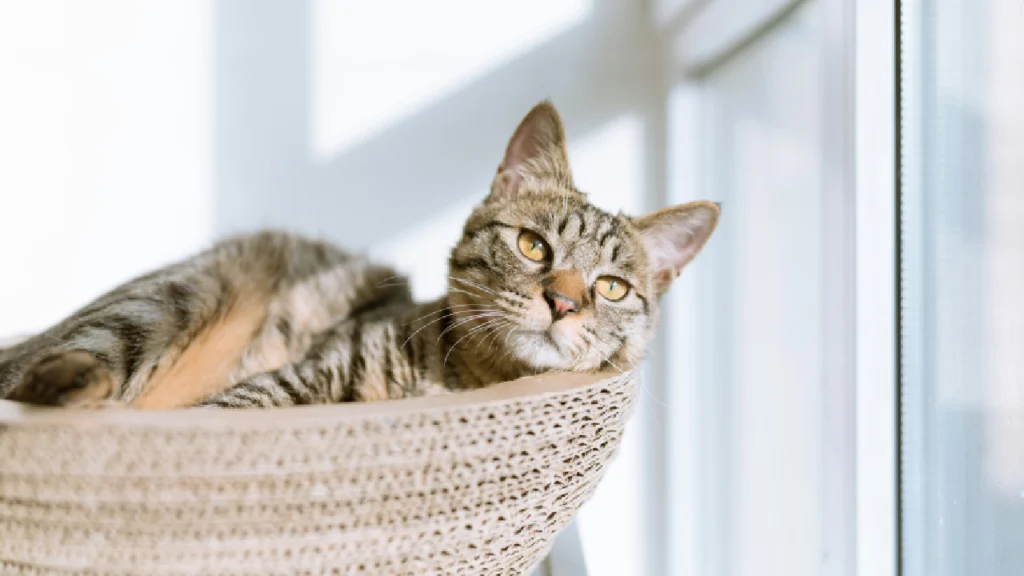
Are your cat’s nocturnal vocals keeping you up all night? Don’t worry! We’ve got some easy solutions to help both you and your feline friend get the rest you need. Let’s dive into why cats meow at night and how to curb this nighttime meowing behavior.
Before we jump into solutions, it’s important to understand why our furry companions become vocal after dark. Several factors can contribute to this behavior:
Cats are creatures of habit. When they’re in a new environment, they might feel insecure or lost. This anxiety can lead to increased meowing, especially at night when it’s quiet and they feel alone.
Unlike dogs, cats prefer to eat small meals throughout the day and night. If your feeding schedule doesn’t match their natural grazing instinct, your cat might wake you up demanding a midnight snack.

Sometimes, cats meow because they’re uncomfortable. This discomfort can be more noticeable at night, particularly if temperatures drop. Kittens and hairless breeds are especially sensitive to cold.
Cats can experience both acute and chronic stress. Loud noises, changes in routine, or past traumas can all lead to increased vocalization, even at night.
Did you know cats are crepuscular? This means they’re naturally more active during dawn and dusk. If your cat has been snoozing all day, they might be ready to play just when you’re trying to sleep.
A dirty or hard-to-reach litter box can be a source of stress for cats. They may meow to express their displeasure, regardless of the time of day or night.

Unaltered cats may become more vocal due to hormonal urges. This is especially true for females in heat and males who can detect a female in heat from far away.
Now that we understand why cats meow at night, let’s explore some practical solutions to help quiet those nighttime serenades.
Cats thrive on predictability. Try to create a daily schedule for feeding, playtime, and cuddles. This routine will help your cat feel secure and less likely to seek attention at night.
One of the most effective ways to reduce nighttime meowing is to tire your cat out before bed. Engage in an interactive play session about an hour before your bedtime. Use toys that mimic prey to satisfy your cat’s hunting instincts.
Ensure your cat has a warm, comfortable place to sleep. This could be a soft bed, a cozy blanket, or even a heated pet pad for chilly nights. Place these items in quiet, draft-free areas of your home.
Consider adjusting your cat’s meal times. Instead of one or two large meals, offer smaller portions throughout the day. An automatic feeder can be a great tool to provide a small meal during the night without disturbing your sleep.
A bored cat is more likely to seek attention at night. Provide a variety of toys, scratching posts, and climbing structures. Rotate toys regularly to keep things interesting. Consider setting up a “catio” or installing cat shelves for more exploration options.
Keep the litter box clean and easily accessible. Some cats prefer uncovered boxes, while others like privacy. Experiment to see what your cat prefers. In multi-story homes, consider placing litter boxes on each level.
Artificial feline pheromone products can help create a calming environment for your cat. These are available as sprays or diffusers. You might also consider calming treats or supplements, but always consult with your veterinarian first.
If possible, designate a specific area for your cat to spend the night. Equip this space with everything they need – a bed, water, litter box, and some toys. Gradually accustom your cat to this area by making it a positive space during the day.
If your cat’s nighttime meowing is a new behavior or seems excessive, it’s important to rule out any underlying health issues. A visit to your veterinarian can help identify and address any medical concerns.
For cats meowing due to hormonal reasons, spaying or neutering can be an effective long-term solution. This procedure not only eliminates heat-related vocalizations but also has numerous health benefits.
As you work on implementing these strategies, remember that change takes time. Be patient with your feline friend and consistent in your approach. It may take a few weeks for your cat to adjust to new routines or environments.
It’s crucial to avoid punishing your cat for meowing, as this can lead to stress and potentially worsen the behavior. Similarly, giving in to your cat’s demands by feeding or playing with them when they meow at night can reinforce the behavior. Instead, focus on meeting their needs proactively during the day and creating an environment that encourages natural sleep patterns.
Every cat is unique, so you may need to experiment with different combinations of these strategies to find what works best for your furry companion. Some cats may respond quickly to changes, while others may take more time to adjust.
Remember, addressing nighttime meowing isn’t just about getting a good night’s sleep for yourself – it’s about ensuring your cat feels secure, comfortable, and content in their environment. By understanding your cat’s needs and implementing these tips, you’re working towards a happier, healthier relationship with your feline friend.
Create a comfortable and engaging nighttime space for your cat with toys, a cozy bed, and their litter box.
Establish a consistent routine, engage in pre-bedtime play, and consider using calming aids or an automatic feeder.
Increase daytime playtime, provide enriching toys, and ensure your cat’s environment is stimulating during the day.
Offer a warm, cozy sleeping area, use calming pheromone products, and stick to a regular schedule to help your cat feel secure.
With patience, understanding, and a little creativity, you can create a nighttime routine that works for both you and your cat. By addressing the root causes of nighttime meowing and providing a stimulating, comfortable environment for your cat, you’re setting the stage for peaceful nights and contented days.

Remember, the journey to a quiet night’s sleep is a process. Celebrate small victories along the way, and don’t get discouraged if progress seems slow. Your efforts will pay off in the long run, resulting in a stronger bond with your cat and better rest for everyone in the household.
So here’s to silent nights and purr-fect days ahead! Your path to harmonious coexistence with your feline friend starts now. Sweet dreams to you and your furry companion!
Leave a comment